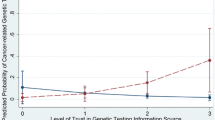Abstract
Although the availability of direct-to-consumer (DTC) genetic testing has increased in recent years, the general public’s awareness of this testing is not well understood. This study examined levels of public awareness of DTC genetic testing, sources of information about testing, and psychosocial factors associated with awareness of testing in the USA. Data were obtained from the nationally representative 2013 U.S. Health Information National Trends Survey. Guided by a social-cognitive conceptual framework, univariable and multivariable logistic regressions were conducted to identify factors associated with awareness of DTC genetic tests. Of 3185 participants, 35.6 % were aware of DTC genetic tests, with the majority learning about these tests through radio, television, and the Internet. In the final adjusted model, participants with annual incomes of $99,999 or less had lower odds of being aware of DTC genetic testing (ORs ranging from 0.46–0.61) than did those participants with incomes of $100,000 or more. The odds of awareness of DTC genetic tests were significantly higher for those who actively seek cancer information (OR = 1.91, 95 % CI = 1.36–2.69), use the Internet (OR = 1.81, 95 % CI = 1.05–3.13), and have high numeracy skills (OR = 1.67, 95 % CI = 1.17–2.38). It will be critical for healthcare researchers and practitioners to understand predictors and consequences of the public’s awareness of DTC genetic tests, as well as how such awareness may translate into DTC genetic testing uptake, health behavior change, and ultimately disease prevention.

Similar content being viewed by others
References
Frueh FW, Greely HT, Green RC, Hogarth S, Siegel S (2011) The future of direct-to-consumer clinical genetic tests. Nat Rev Genet 12:511–515
Global Industry Analysts (2012) Future of Direct-to-Consumer (DTC) Genetic Testing Market Remains Fraught. PRWeb Internet. Available at: http://www.prweb.com/releases/DTC_genetic_testing/direct_to_consumer_tests/prweb9780295.htm
Lewis NP, Treise D, Hsu SI, Allen WL, Kang H (2011) DTC genetic testing companies fail transparency prescriptions. New Genet Soc 30:291–307
U.S.Food and Drug Administration. (2014) Warning letter, 23andMe, Inc. 11/22/13. Inspections, compliance, enforcement, and criminal investigations. Available at: http://www.fda.gov/ICECI/EnforcementActions/WarningLetters/2013/ucm376296.htm
U.S.Food and Drug Administration (14 A.D.) FDA takes steps to help ensure the reliability of certain diagnostic tests. Available at: http://www.fda.gov/NewsEvents/Newsroom/PressAnnouncements/ucm407321.htm
Langford AT, Resnicow K, Roberts JS, Zikmund-Fisher BJ (2012) Racial and ethnic differences in direct-to-consumer genetic tests awareness in HINTS 2007: sociodemographic and numeracy correlates. J Genet Couns 21:440–447
Finney Rutten LJ, Gollust SE, Naveed S, Moser RP (2012) Increasing public awareness of direct-to-consumer genetic tests: health care access, internet use, and population density correlates. J Cancer Epidemiol 2012:309109
Kolor K, Duquette D, Zlot A et al (2012) Public awareness and use of direct-to-consumer personal genomic tests from four state population-based surveys, and implications for clinical and public health practice. Genet Med 14:860–867
Foster C, Evans DG, Eeles R et al (2002) Predictive testing for BRCA1/2: attributes, risk perception and management in a multi-centre clinical cohort. Br J Cancer 86:1209–1216
Kelly KM, Andrews JE, Case DO, Allard SL, Johnson JD (2007) Information seeking and intentions to have genetic testing for hereditary cancers in rural and Appalachian Kentuckians. J Rural Health 23:166–172
Leighton JW, Valverde K, Bernhardt BA (2011) The general public's understanding and perception of direct-to-consumer genetic test results. Public Health Genomics
Lea DH, Kaphingst KA, Bowen D, Lipkus I, Hadley DW (2011) Communicating genetic and genomic information: health literacy and numeracy considerations. Public Health Genomics 14:279–289
Caulfield T, Ries NM, Ray PN, Shuman C, Wilson B (2010) Direct-to-consumer genetic testing: good, bad or benign? Clin Genet 77:101–105
Cameron LD, Sherman KA, Marteau TM, Brown PM (2009) Impact of genetic risk information and type of disease on perceived risk, anticipated affect, and expected consequences of genetic tests. Health Psychol 28:307–316
Glanz K, Grove J, Lerman C, Gotay C, Le ML (1999) Correlates of intentions to obtain genetic counseling and colorectal cancer gene testing among at-risk relatives from three ethnic groups. Cancer Epidemiol Biomarkers Prev 8:329–336
National Cancer Institute (2014) Health Information National Trends Survey 4 (HINTS 4): Cycle 3 Methodology Report. In Westat (Ed.). Rockville, MD: National Cancer Institute
Weiss BD, Mays MZ, Martz W et al (2005) Quick assessment of literacy in primary care: the newest vital sign. Ann Fam Med 3:514–522
Su P (2013) Direct-to-consumer genetic testing: a comprehensive view. Yale J Biol Med 86:359–365
Waters EA, Muff J, Hamilton JG (2014) Multifactorial beliefs about the role of genetics and behavior in common health conditions: prevalence and associations with participant characteristics and engagement in health behaviors. Genet Med 16:913–921
Cline RJ, Haynes KM (2001) Consumer health information seeking on the Internet: the state of the art. Health Educ Res 16:671–692
Smerecnik C, Quaak M, van Schayck CP, van Schooten FJ, De Vries H (2011) Are smokers interested in genetic testing for smoking addiction? A socio-cognitive approach. Psychol Health 26:1099–1112
Kaphingst KA, Lachance CR, Condit CM (2009) Beliefs about heritability of cancer and health information seeking and preventive behaviors. J Cancer Educ 24:351–356
Chen Y, Feeley TH (2014) Numeracy, information seeking, and self-efficacy in managing health: an analysis using the 2007 Health Information National Trends Survey (HINTS). Health Commun 29:843–853
Graves KD, Peshkin BN, Luta G, Tuong W, Schwartz MD (2011) Interest in genetic testing for modest changes in breast cancer risk: implications for SNP testing. Public Health Genomics 14:178–189
Hanoch Y, Miron-Shatz T, Rolison JJ, Ozanne E (2014) Understanding of BRCA1/2 genetic tests results: the importance of objective and subjective numeracy. Psychooncology
Conflict of Interest
The authors have no conflicts of interests or financial interests to disclose.
Author information
Authors and Affiliations
Corresponding author
Rights and permissions
About this article
Cite this article
Agurs-Collins, T., Ferrer, R., Ottenbacher, A. et al. Public Awareness of Direct-to-Consumer Genetic Tests: Findings from the 2013 U.S. Health Information National Trends Survey. J Canc Educ 30, 799–807 (2015). https://doi.org/10.1007/s13187-014-0784-x
Published:
Issue Date:
DOI: https://doi.org/10.1007/s13187-014-0784-x




